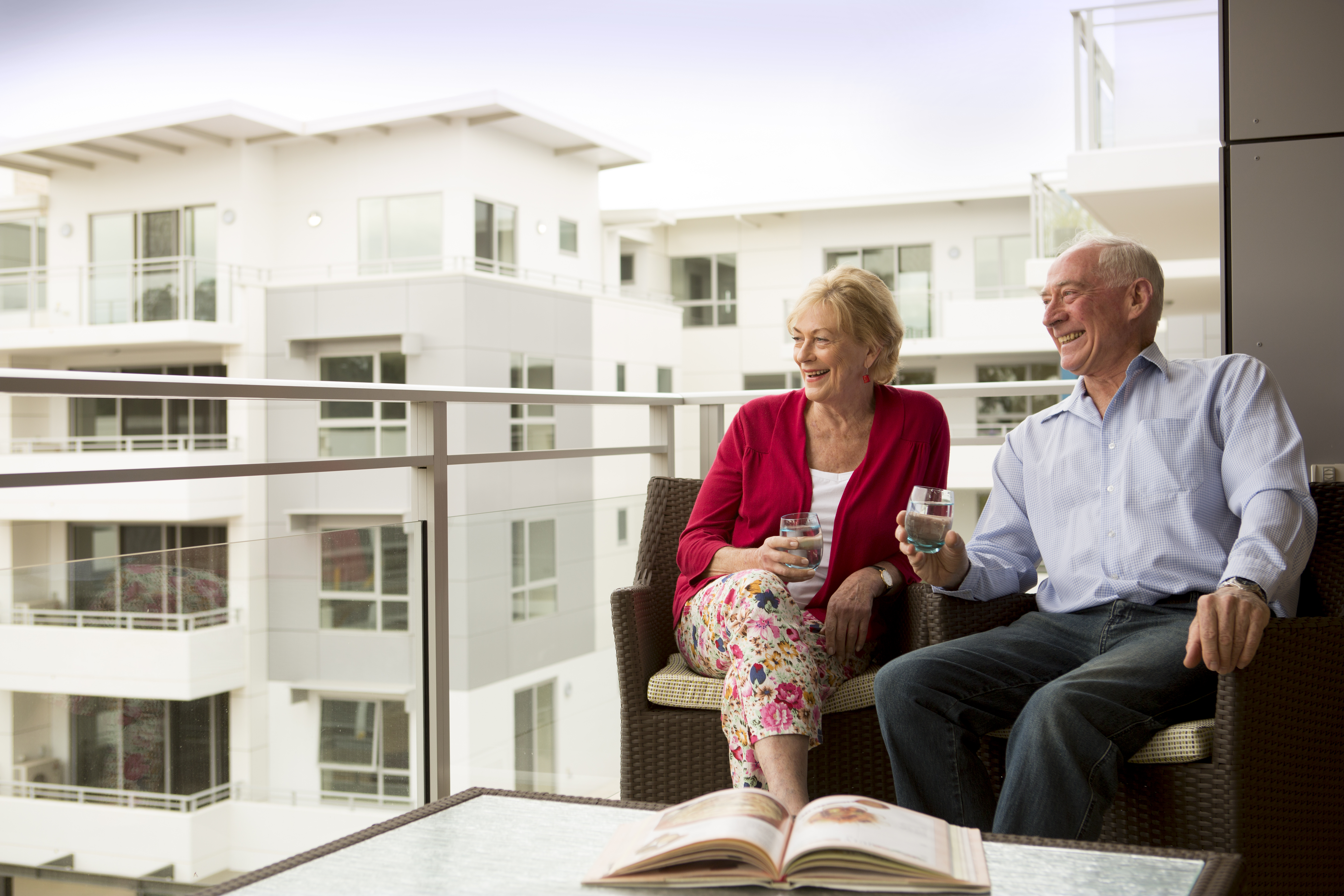Downsizing to a retirement village? Here are three steps to a stress-free move
If you’re preparing to downsize from your family home into a retirement village, you may be feeling slightly daunted by the task ahead of you. The trick is to take it one stage at a time, so we’ve broken the journey down for you into three manageable steps.
Scroll to Explore

24 November 2023
Stories
| Retirement Living
Download this article as a printable PDF.
Moving into a retirement community is an exciting time, with all the wonderful benefits that retirement living offers just around the corner – a strong sense of community and engaging social scene, beautiful amenities right on your doorstep, and the peace of mind that comes with relinquishing a large proportion of your property maintenance.
But for many seniors, the task of downsizing can be daunting. For some, it’s the first house move they’ve navigated in a long time – there could be decades’ worth of belongings to go through!
The good news is that with the right support and an ironclad plan, the move can be easy, stress-free, and even liberating.
In this article:
Stage 1 - PREPARE Downsizing and decluttering
It is a great truism that preparation is the key to success. By decluttering and reducing the number of items you need to move, you’ll be preparing the way for a much easier, smoother move.
Be kind to yourself and give yourself plenty of time for the decluttering process.
We recommend giving yourself at least three months from your ideal moving date.
Start with the garage and the rooms you don’t tend to use day to day, and then work your way methodically around the house.
Try these handy tips to efficiently reduce your items:
- Enlist help - Ask friends and family to support you practically as much as possible. You can also engage professionals throughout the process – read the BaptistCare support to learn about some of our trusted partners.
- Return others’ belongings - If you’re storing items for your children or grandchildren, now’s the time to ask them to take these back to their own homes.
- Do you really need it? Consider what you’ll need for your future lifestyle – for example, will you really need that dining table that seats ten people? Or all that kitchen crockery? Now’s the time to make a fresh start. Many retirement villages offer beautiful entertaining spaces, and you can always rent furniture if it’s a special occasion.
- Go digital – got a collection of heavy photo albums? Consider transferring your photos to ‘the cloud’ by taking pictures of your pictures – ask a friend or family member to help you if you’re not sure how to do this. You could also invest in a lightweight e-reader device and digitally store all your favourite books in one place.
- Pass on those family heirlooms - Work out what sentimental items you’d like to take - now might also be the time to gift some of those precious family heirlooms to the next generation.
- Donate to local charities – By donating unwanted belongings and furniture, you’ll be supporting those who may be struggling financially in your community.
- Hold a garage sale – This can be a great way to sell on many of your belongings like kitchen items, clothing, Manchester, knick-knacks, and even furniture.

BaptistCare support
Some BaptistCare retirement villages partner with fantastic organisations that can support you with the downsizing process - just contact your BaptistCare retirement village management team for details. These may include:
- Clear-out specialists who remove and ethically dispose of unwanted items from your home
- Packing (and unpacking) services that can have you unpacked and settled into your new home in half a day
- Quality, trustworthy real estate agents
- Removalists who are reliable and treat belongings with care and respect.
Remember - a positive and calm attitude throughout the process is key. Enjoy the liberation of decluttering – it can be a refreshing experience!
Stage 2 - SELL Putting your house on the market
Now that you’ve decluttered your home, the task of tidying up and making the house look neutral and presentable for potential buyers will be that bit easier.
Once your house has been listed on the market, ideally, you’ll want to sell it within two to three weeks. After this, it can be harder to sell your home as potential buyers may equate the lack of sale with an issue with the property.
Therefore, it’s important to make sure your home is completely ready before you put it on the market, to give it the best possible chance of a quick sale.
This might involve:
- Attending to odd jobs around the house – do the walls need a fresh lick of paint? Are there any chips or cracks that need filling? Do your carpets need a steam clean? Now’s the time to get your home looking spick and span for upcoming open homes.
- Keep it neutral - Houses usually sell much faster if potential buyers can imagine themselves living there, so try to remove as many of your personal belongings as possible and keep the décor neutral.
- Engage a quality real estate agent – They will be able to provide a valuation of your property and help you market it for sale. Don’t forget to shop around and get a few options.
- Consider hiring legal professionals – A solicitor or conveyancer will guide you through the often-complicated process of disclosure and exchange. They can also help you navigate negotiations with the buyer. Hiring professional legal help also ensures you know your rights and obligations throughout the entire selling process.
Once you have successfully sold your property, take a moment to celebrate! It’s almost time to embrace the next chapter of your life!
The only stage left is to prepare for your move.
Stage 3 - MOVE A stress-free transition
Once you’ve sold your home and confirmed your move-in date with the retirement village management team, it’s time to get packing!
Many people choose to engage professional removalists who can assist you with packing (and unpacking) your belongings ready for the move.
In addition, you can also prepare by:
- Redirecting your mail
- Organising utilities for your new home
- Notifying relevant contacts and organisations of your new address
- If you have a pet, it might be worth organising care of them while you move so that they don’t become distressed.

Moving is a major life event and it’s a good idea to draw on support from family and friends if you can on the day. Try to get a good night’s rest before you move and remember to stay well hydrated throughout the day, taking regular breaks.
If you’ve lived in your family home for a long time, the move to a retirement community will take a bit of getting used to. Give yourself time to settle and get used to the change of lifestyle – it will absolutely be worth all the effort!
Find a retirement village near me
If you’re curious to see the benefits of retirement living for yourself, why not book a tour of your closest village?
Use our handy online tool to find a location in New South Wales or Canberra.
Make an enquiry
If you would like to know more, please complete the form and one of our retirement living specialists will be in touch.